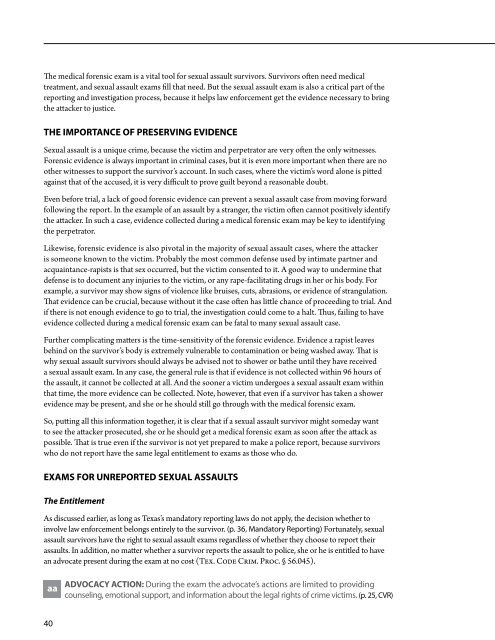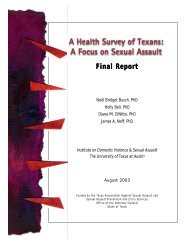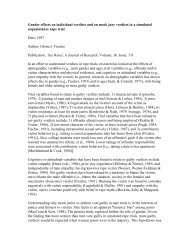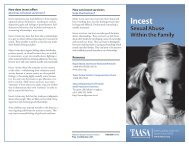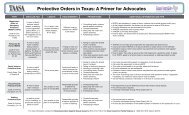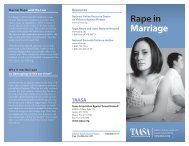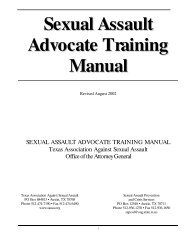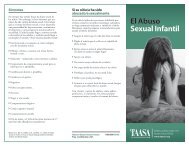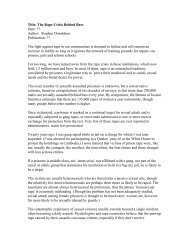Sexual aSSault LEGAL ADVOCACY MANUAL - Texas Association ...
Sexual aSSault LEGAL ADVOCACY MANUAL - Texas Association ...
Sexual aSSault LEGAL ADVOCACY MANUAL - Texas Association ...
You also want an ePaper? Increase the reach of your titles
YUMPU automatically turns print PDFs into web optimized ePapers that Google loves.
The medical forensic exam is a vital tool for sexual assault survivors. Survivors often need medical<br />
treatment, and sexual assault exams fill that need. But the sexual assault exam is also a critical part of the<br />
reporting and investigation process, because it helps law enforcement get the evidence necessary to bring<br />
the attacker to justice.<br />
The Importance of Preserving Evidence<br />
<strong>Sexual</strong> assault is a unique crime, because the victim and perpetrator are very often the only witnesses.<br />
Forensic evidence is always important in criminal cases, but it is even more important when there are no<br />
other witnesses to support the survivor’s account. In such cases, where the victim’s word alone is pitted<br />
against that of the accused, it is very difficult to prove guilt beyond a reasonable doubt.<br />
Even before trial, a lack of good forensic evidence can prevent a sexual assault case from moving forward<br />
following the report. In the example of an assault by a stranger, the victim often cannot positively identify<br />
the attacker. In such a case, evidence collected during a medical forensic exam may be key to identifying<br />
the perpetrator.<br />
Likewise, forensic evidence is also pivotal in the majority of sexual assault cases, where the attacker<br />
is someone known to the victim. Probably the most common defense used by intimate partner and<br />
acquaintance-rapists is that sex occurred, but the victim consented to it. A good way to undermine that<br />
defense is to document any injuries to the victim, or any rape-facilitating drugs in her or his body. For<br />
example, a survivor may show signs of violence like bruises, cuts, abrasions, or evidence of strangulation.<br />
That evidence can be crucial, because without it the case often has little chance of proceeding to trial. And<br />
if there is not enough evidence to go to trial, the investigation could come to a halt. Thus, failing to have<br />
evidence collected during a medical forensic exam can be fatal to many sexual assault case.<br />
Further complicating matters is the time-sensitivity of the forensic evidence. Evidence a rapist leaves<br />
behind on the survivor’s body is extremely vulnerable to contamination or being washed away. That is<br />
why sexual assault survivors should always be advised not to shower or bathe until they have received<br />
a sexual assault exam. In any case, the general rule is that if evidence is not collected within 96 hours of<br />
the assault, it cannot be collected at all. And the sooner a victim undergoes a sexual assault exam within<br />
that time, the more evidence can be collected. Note, however, that even if a survivor has taken a shower<br />
evidence may be present, and she or he should still go through with the medical forensic exam.<br />
So, putting all this information together, it is clear that if a sexual assault survivor might someday want<br />
to see the attacker prosecuted, she or he should get a medical forensic exam as soon after the attack as<br />
possible. That is true even if the survivor is not yet prepared to make a police report, because survivors<br />
who do not report have the same legal entitlement to exams as those who do.<br />
Exams for Unreported <strong>Sexual</strong> Assaults<br />
The Entitlement<br />
As discussed earlier, as long as <strong>Texas</strong>’s mandatory reporting laws do not apply, the decision whether to<br />
involve law enforcement belongs entirely to the survivor. (p. 36, Mandatory Reporting) Fortunately, sexual<br />
assault survivors have the right to sexual assault exams regardless of whether they choose to report their<br />
assaults. In addition, no matter whether a survivor reports the assault to police, she or he is entitled to have<br />
an advocate present during the exam at no cost (Tex. Code Crim. Proc. § 56.045).<br />
<strong>ADVOCACY</strong> ACTION: During the exam the advocate’s actions are limited to providing<br />
counseling, emotional support, and information about the legal rights of crime victims. (p. 25, CVR)<br />
40


